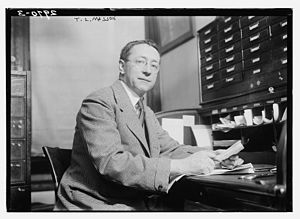Thomas Lansing Masson
Jump to navigation
Jump to search
Thomas Lansing Masson (1866–1934) was an American anthropologist, editor and author.[1]
Biography
He was born at Essex, Connecticut, and educated in the public schools of New Haven. He became literary editor of Life in 1893 and a regular contributor of humorous articles to various magazines. As an editor, he was responsible for Humorous Masterpieces of American Literature (1904); The Humor of Love in Verse and Prose (1906); The Best Stories in the World (1914).
Publications
- (1898). The Yankee Navy.
- (1904). In Marry Measure.
- (1905). A Corner in Women and Other Follies.
- (1905). Mary's Little Lamb.
- (1906). The Von Blumers.
- (1907). A Bachelor's Baby and Some Grown-Ups.
- (1908). The New Plato.
- (1913). Mr. Rum.
- (1921). Well, Why Not?.
- (1922). Listen to These.
- (1923). That Silver Lining.
- (1925). Why I Am a Spiritual Vagabond.
- (1927). The City of Perfection.
- (1932). Within.
Selected articles
- (1922). "Shall we be Wrecked by Realism," The World's Work 43, pp. 435–439.
- (1922). "Teaching Children to Teach Themselves," The World's Work 44, pp. 410–414.
References
- ^ Everett Franklin Bleiler, Richard Bleiler (1990) Science-fiction, the Early Years. p. 845
External links
Wikisource has original works by or about:
[[:s:|]]
[[:s:|]]
Wikiquote has quotations related to Thomas Lansing Masson.
- Works by or about Thomas Lansing Masson at Internet Archive
- Works by Thomas Lansing Masson, at Hathi Trust
- Works by Thomas Lansing Masson at LibriVox (public domain audiobooks)

- Works by Thomas Lansing Masson, at JSTOR
 This article incorporates text from a publication now in the public domain: Gilman, D. C.; Peck, H. T.; Colby, F. M., eds. (1905). "Thomas Masson". New International Encyclopedia (1st ed.). New York: Dodd, Mead.
This article incorporates text from a publication now in the public domain: Gilman, D. C.; Peck, H. T.; Colby, F. M., eds. (1905). "Thomas Masson". New International Encyclopedia (1st ed.). New York: Dodd, Mead.
Categories:
- Articles with short description
- Wikisource templates with missing id
- Articles with Internet Archive links
- Articles with LibriVox links
- AC with 0 elements
- 1866 births
- 1934 deaths
- American anthropologists
- American humorists
- American male journalists
- American male novelists
- Novelists from Connecticut
- Writers from New Haven, Connecticut
- People from Essex, Connecticut
- All stub articles
- American novelist, 19th-century birth stubs
